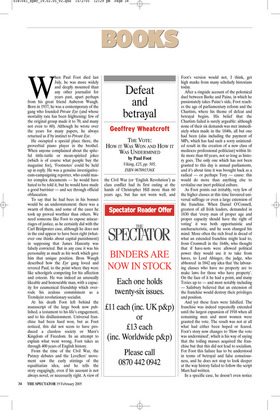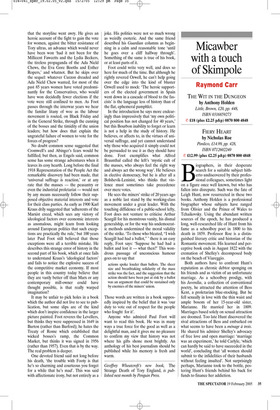Defeat and betrayal
Geoffrey Wheatcroft
THE VOTE: HOW IT WAS WON AND HOW IT WAS UNDERMINED by Paul Foot Viking, £25, pp. 505, ISBN 067091536X the Civil War (or ‘English Revolution’) as class conflict had its first outing at the hands of Christopher Hill more than 60 years ago, but has not worn well, and When Paul Foot died last July, he was more widely and deeply mourned than any other journalist for years past, apart perhaps from his great friend Auberon Waugh. Born in 1937, he was a contemporary of the gang who founded Private Eye (and whose mortality rate has been frightening: few of the original group made it to 70, and many not even to 60). Although he wrote over the years for many papers, he always returned as if by instinct to Private Eye.
He occupied a special place there, the proverbial piano player in the brothel. When anyone complained about the spiteful tittle-tattle or mean-spirited jokes (which is of course what people buy the magazine for), ‘Footnotes’ could be held up in reply. He was a genuine investigativecum-campaigning reporter, who could master complex documents — he would have hated to be told it, but he would have made a good barrister — and see through official obfuscation.
To say that he had bees in his bonnet would be an understatement: there was a swarm of them, and some of the cases he took up proved worthier than others. We need someone like Foot to expose miscarriages of justice, as he certainly did with the Carl Bridgwater case, although he does not in the end appear to have been right (whatever one thinks about capital punishment) in supposing that James Hanratty was falsely convicted. But in any case it was his personality as much as his work which gave him that unique position. Bron Waugh described how the Eye gang loved and revered Paul, to the point where they were like schoolgirls competing for his affection and esteem. He was indeed an unusually likeable and honourable man, with a capacity for ecumenical friendship which overrode his zealous commitment as a Trotskyist revolutionary socialist.
At his death Foot left behind the manuscript of the large book now published, a testament to his life’s engagement, and to his disillusionment. Universal franchise had been hard won, but as Foot noticed, this did not seem to have produced a classless society or Marx’s Kingdom of Freedom. In an attempt to explain what went wrong, Foot takes us through 400 years of English history.
From the time of the Civil War, the Putney debates and the Levellers’ movement saw the early stirrings of the equalitarian idea, and he tells the story engagingly, even if his account is not always novel, or necessarily right. A view of Foot’s version would not, I think, get high marks from many scholarly historians today.
After a ringside account of the polemical duel between Burke and Paine, in which he passionately takes Paine’s side, Foot reaches the age of parliamentary reform and the Chartists, where his theme of defeat and betrayal begins. His belief that the Chartists failed is surely arguable: although none of their six demands was met immediately when made in the 1840s, all but one had been (alas including the payment of MPs, which has had such a sorry unintended result in the creation of a new class of mediocre professional politician) within little more than 60 years, not so long as history goes. The only one which has not been granted to this day is annual parliaments, and it’s about time it was brought back as a radical — or perhaps Tory — cause: this would do more than anything else to revitalise our inert political culture.
As Foot points out irritably, very few of the higher classes at this time favoured universal suffrage or even a large extension of the franchise. When Daniel O’Connell, greatest of all Irish leaders, demanded in 1830 that ‘every man of proper age and proper capacity should have the right of voting’ it was both opportunistic and uncharacteristic, and he soon changed his mind. More often the rich lived in dread of what an extended franchise might lead to, from Cromwell in the 1640s, who thought that if have-nots were allowed political power they would use it to take from haves, to Lord Abinger, the judge, who abhorred in 1842 any idea that ‘the labouring classes who have no property are to make laws for those who have property’. On the face of it he had a point, and many Tories up to — and most notably including — Salisbury believed that an extension of the franchise would destroy their privileges and position.
And yet these fears were falsified. The franchise was indeed repeatedly extended until the largest expansion of 1918 when all remaining men and most women were granted the vote. The result was not at all what had either been hoped or feared. Foot’s story now changes to ‘How the vote was undermined’, which is his way of saying that the toiling masses acquired the franchise but that this did not lead to socialism. For Foot this failure has to be understood in terms of betrayal and false consciousness, and he does not stop to look deeper at the way history failed to follow the script Marx had written.
In a specific case, he doesn’t even notice that the storyline went awry. He gives an heroic account of the fight to gain the vote for women, against the bitter resistance of Tory ultras, an advance which would never have been won ‘had it not been for the Millicent Fawcetts and the Lydia Beckers, the tireless propaganda of the Ada Nield Chews, the Eva Gore Booths and Esther Ropers,’ and whatnot. But he skips over the sequel: whatever Curzon dreaded and Ada Nield Chew wanted, for most of the past 85 years women have voted predominantly for the Conservatives, who would have won decidedly fewer elections if the vote were still confined to men. As Foot passes through the interwar years we hear the familar litany of woe as the labour movement is routed, on Black Friday and in the General Strike, through the cunning of the bosses and the timidity of the union leaders; but how does that explain the ungrateful failure of women to vote for the forces of progress?
No doubt common sense suggested that Cromwell’s and Abinger’s fears would be fulfilled, but then, as Engels said, common sense has some strange adventures when it leaves its cosy hearth. Long before the final 1918 Representation of the People Act the remarkable discovery had been made, that ‘universal suffrage is reaction,’ or at any rate that the masses — the peasantry or even the industrial proletariat — would not by any means necessarily follow their supposed objective material interests and vote for their class parties. As early as 1900 Karl Kraus drily suggested that ‘adherents of the Marxist creed, which sees any victory of ideological factors over economic interests as anomalous, might learn from looking around European politics that such exceptions are practically the rule,’ but 100 years later Paul Foot still believed that those exceptions were all a terrible mistake. He describes this strange error of history in the second part of his book, which at once fails to understand Kraus’s ‘ideological factors’ and fails to notice the explosive success of the competitive market economy. If most people in this country today believe that they are vastly better off than Marx or any contemporary mill-owner could have thought possible, is that really warped imagination?
It may be unfair to pick holes in a book which the author did not live to see to publication, but some slips are of the kind which don’t inspire confidence in the larger picture painted. Foot reveres the Levellers, but thinks they were suppressed in 1649 in Burton (rather than Burford); he hates the Treaty of Rome which established that wicked bosses’s ramp, the Common Market, but thinks it was signed in 1956 (rather than 1957). Even that is by the way. The real problem is deeper.
One devoted friend said not long before his death, ‘the trouble with Footy is that he’s so charming and courteous you forget for a while that he’s mad’. This was said with affectionate irony, but not entirely as a joke. His politics were not so much wrong as weirdly esoteric. And the same friend described his Guardian columns as beginning in a calm and reasonable tone ‘until he goes over a cliff halfway through’. Something of the same is true of his book, or at least parts of it.
Foot could write very well, and does so here for much of the time. But although he rightly revered Orwell, he can’t help going over the edge into the kind of bluster Orwell used to mock: ‘The heroic supporters of the elected government in Spain went down in a cascade of blood to the fascists’ is the language less of history than of the flat, ephemeral pamphlet.
In the introduction he says more endearingly than impressively that ‘my own political position has not changed for 40 years,’ but this Bourbon inability to forget or learn is not a help in the study of history. He believes, or affects to, in the virtues of universal suffrage, and yet cannot understand why those who acquired it simply could not be persuaded to use it as they should have done. Foot exemplifies what Alfred Braunthal called the left’s ‘mystic cult of the masses, who always feel the right way and always act the wrong way’. He believes in elective democracy, but he is after all a Bolshevik-Leninist, who thinks that violence must sometimes take precedence over mere votes.
He sees the miners’ strike of 20 years ago as a noble last stand by the working-class movement under a great leader. With the touching diffidence of a public-school lefty, Foot does not venture to criticise Arthur Scargill for his monstrous vanity, his dismal generalship, or for the way his undemocratic methods undermined the moral validity of the strike. ‘To those who bleated, “I wish Scargill had had a ballot,” ’ there is an easy reply, Foot says: ‘Suppose he had had a ballot and lost it — what then?’ This wondrous passsage of unconscious humour goes on to say that
actions spoke louder than ballots. The sheer size and breathtaking solidarity of the mass strike was the fact, and the suggestion that the action should have been put at risk by a ballot was an argument that could be sustained only by enemies of the miners’ union.
Those words are written in a book supposedly inspired by the belief that it was ‘our duty to vote out of respect for the people who fought for it’.
Anyone who admired Paul Foot will want to read this book. He was in many ways a true force for the good as well as a delightful man, and it gives me no pleasure to confirm my view that history was not where his gifts shone most brightly. An anthology of his best journalism should be published while his memory is fresh and warm.


















































 Previous page
Previous page